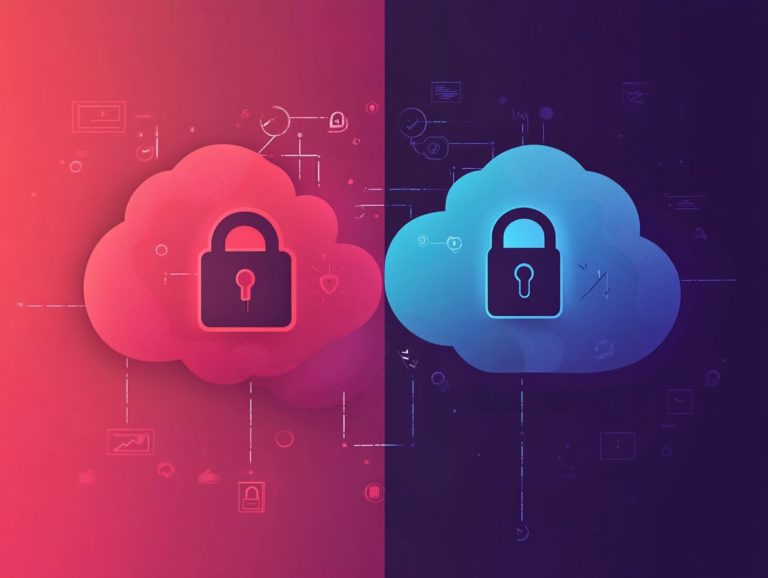managed security services: a business necessity
In today s digital landscape, safeguarding sensitive data and systems is crucial. Managed Security Services (MSS) offer businesses a strong set of security services to protect against various cyber threats, including malware and data breaches.
This article explores the definition and scope of MSS, highlighting their vital role in tackling the rising cybersecurity challenges. You ll also learn about the different types of services available.
We re here to help you select the right provider to strengthen your business’s security posture. Discover how MSS can transform your organization.
Contents
Key Takeaways:

Managed security services are essential for businesses due to the increasing number of cybersecurity threats and the need for cost-effective solutions, as highlighted in our guide on managed security services: what you need to know.
The three main types of managed security services are network security, endpoint security, and cloud security.
These services play a critical role in protecting a company’s assets. When choosing a managed security services provider, consider factors like experience, expertise, and the role of managed security services in cyber defense, as well as the ability to customize solutions to fit your business’s specific needs.
Understanding Managed Security Services
Managed Security Services (MSS) provide a strong set of cybersecurity solutions designed to protect your business from various online threats, including cybercrime and security breaches. For more insights, explore the seamless integration of managed security services.
For small to medium-sized businesses (SMBs) lacking in-house expertise to handle security effectively, these services are vital. By partnering with a Managed Security Services Provider (MSSP), you can significantly enhance your security posture while ensuring compliance with essential regulations like GDPR, which protects personal data, and the NIS 2 Directive.
MSS offers cost-effective solutions that leverage advanced technologies such as AI and machine learning, improving your threat detection and incident response capabilities.
Why Managed Security Services are Essential for Businesses
The importance of Managed Security Services (MSS) for your business is significant, especially as cybersecurity threats grow more complex and pervasive. Understanding the evolution of managed security services can help you stay informed and prepared.
Small businesses, in particular, face substantial risks from cybercrime, leading to financial losses, security breaches, and damage to their reputation.
Investing in MSS can bolster your security measures and ensure seamless operations. This strategic move strengthens your resilience against various cyber threats, safeguarding your organization’s future.
Rising Cybersecurity Threats

As cyber threats continue to rise, organizations face an increasing number of security incidents that pose significant risks to digital assets and information security.
From ransomware attacks to phishing schemes, the landscape of cybersecurity threats is becoming more complex, making effective threat detection a key component of your security strategy.
The emergence of advanced persistent threats (APTs) demonstrates the sophisticated tactics used by cybercriminals to infiltrate networks over long periods, stealing sensitive data without detection.
For example, zero-day exploits, where hackers take advantage of previously unknown vulnerabilities, highlight the limitations of merely reactive measures. The potential financial fallout and reputational damage from such breaches can be catastrophic, emphasizing the pressing need for proactive strategies now!
Managed security services serve as a vital solution, offering expert monitoring and threat intelligence. This allows your organization to detect and address vulnerabilities before they can be exploited. For more information, check out understanding managed security services for businesses, which can help fortify your defenses in an increasingly perilous digital landscape.
Cost-Effective Solution
Investing in Managed Security Services (MSS) offers a cost-effective solution to meet your cybersecurity needs while ensuring compliance with various regulations. Use automated processes and advanced security tools to significantly alleviate the financial strain that comes with maintaining in-house security teams and technology.
This centralized approach streamlines your operations and improves incident management. By outsourcing security functions, you can redirect resources toward growth initiatives instead of constantly funding training and technology updates.
MSS typically provide 24/7 monitoring and incident response capabilities, ensuring that you remain vigilant against emerging threats. With built-in compliance support, you’ll find it easier to navigate the complexities of regulations, ultimately reducing the risk of costly fines.
With these benefits, you’ll save significantly, making MSS an exciting choice for forward-thinking businesses like yours.
Types of Managed Security Services
Managed Security Services (MSS) offer a range of solutions designed to meet the varied security demands of organizations, providing robust protection against the constantly evolving landscape of cyber threats. These services encompass network security, endpoint security, and cloud security, each specifically designed to address specific vulnerabilities and strengthen your overall security posture. For a deeper insight, consider understanding the scope of managed security services.
Network Security

Network security is a cornerstone of Managed Security Services, designed to protect your IT systems from online threats and unauthorized access.
By leveraging a variety of security solutions such as firewalls, intrusion detection systems, and continuous threat monitoring you can effectively protect your digital assets and maintain seamless operations.
This comprehensive strategy dissuades potential intrusions and establishes a robust layered defense essential in today s digital landscape.
Incorporating advanced tools such as antivirus software and Virtual Private Networks (VPNs) allows you to secure endpoints and control the flow of data.
Effective threat monitoring is crucial, allowing for real-time analysis of network activity and helping to pinpoint unusual patterns that could signify a breach.
Continuously refining your security protocols based on these insights significantly reduces vulnerabilities and enables swift responses to emerging risks, ensuring a resilient and secure operating environment.
Endpoint Security
Endpoint security is vital in Managed Security Services, protecting each device within your organization from cybersecurity threats and potential breaches. With the surge in remote work and a more mobile workforce, implementing strong security measures for endpoints is essential for maintaining your business s overall security posture.
This importance grows as you encounter an expanding array of cyber threats, from malware and ransomware to clever phishing attacks. Effective endpoint security solutions, like antivirus software, serve as your first line of defense by detecting and mitigating these risks at the device level.
Integrating endpoint detection and response technologies provides deeper visibility into endpoint activities, allowing for swift identification and remediation of vulnerabilities. This comprehensive strategy not only protects sensitive data but also enhances regulatory compliance and fosters trust with clients, underscoring the critical role of endpoint security in modern Managed Security Services.
Cloud Security
In today s digital world, securing your cloud is more crucial than ever! Cloud security is very important as you move operations to the cloud. Protecting data and ensuring compliance are key to maintaining client trust.
This transition brings unique challenges, including managing multiple stakeholders and the complexity of securing diverse environments. You must navigate issues such as data breaches, account hijacking, and insider threats. A complete security plan is essential for your success.
To tackle these challenges, leveraging advanced tools and strategies like encryption, multi-factor authentication, and continuous monitoring is crucial for effectively mitigating risks.
Ongoing employee training is also important, ensuring that your security measures remain current. This helps your organization not only protect against existing threats but also prepare for future vulnerabilities in your cloud landscape.
How Managed Security Services Work

Managed Security Services (MSS) function by seamlessly integrating essential components designed to deliver comprehensive security management solutions tailored for your business, including the benefits of proactive managed security services.
These components often encompass threat monitoring, incident response capabilities, and vulnerability management, empowering your organization to effectively respond to and mitigate security threats with confidence and precision.
Key Components and Processes
The key components of Managed Security Services involve a range of processes tailored to enhance your threat detection and response capabilities. This ensures your organization is fully equipped to handle potential security incidents.
This means implementing advanced security tools and establishing a dedicated incident response team that effectively manages threats. These services utilize real-time monitoring systems that analyze network traffic and user behavior to spot anomalies that could indicate a breach.
Continuous vulnerability assessments are crucial as they help you identify weaknesses before they can be exploited by malicious actors. Security analytics plays a vital role in correlating events from multiple data sources, giving you a comprehensive view of your security landscape.
By integrating threat intelligence, you can stay ahead of emerging threats and ensure that proactive measures are firmly in place. This multi-faceted approach not only strengthens your defenses but also enables swift remediation actions in response to incidents, preserving operational integrity and maintaining trust.
Choosing the Right Managed Security Services Provider
Choosing the right Managed Security Services Provider (MSSP) is a pivotal decision for any business aiming to bolster its cybersecurity posture, especially when considering what to expect from managed security services.
You need to evaluate several essential factors, including the MSSP’s expertise in addressing your specific security requirements, their standing in the industry, and the breadth of services they provide.
This careful selection process can significantly impact your organization’s overall security strategy and resilience.
Factors to Consider
Choosing the right Managed Security Services Provider (MSSP) is crucial for your business’s protection. To stay ahead, consider the future of managed security services: trends to follow and prioritize compliance support as well as data protection capabilities in your decision-making process.
When evaluating MSSPs, consider their experience in the industry, as it can significantly influence your decision.
Also, evaluate the scalability of the MSSP s services. As your operations grow or adapt to emerging threats, their cybersecurity measures must evolve accordingly.
Custom solutions are crucial. They effectively address the unique vulnerabilities of your industry or business model.
Don t overlook the MSSP’s incident response capabilities. Assess how quickly they can mitigate potential breaches, as this directly impacts the integrity of your sensitive information.
Understanding the quality of customer support they provide is equally important. A strong support team enhances your confidence and fosters a collaborative relationship that prioritizes security at every level.
Frequently Asked Questions
What are managed security services: a comprehensive overview and why are they a business necessity? Managed security services refer to outsourcing the management of an organization’s security needs to a third-party provider. They are a business necessity because they provide 24/7 monitoring, threat detection and response, and overall improved security level for businesses of all sizes.
What services are typically included in managed security services?
Managed security services typically include network and endpoint security, threat detection and response, data backup and disaster recovery, vulnerability management (this involves identifying and fixing weaknesses in your system), and managed firewall and intrusion detection.
What are the benefits of using managed security services for my business?
The benefits include increased efficiency and cost savings, access to specialized expertise and cutting-edge technology, improved compliance with industry regulations, and reduced risk of cyber attacks and data breaches.
How do managed security services protect my business from cyber threats?
They protect your business by providing constant monitoring of your network and endpoints, timely threat detection and response, and vulnerability management to identify and mitigate potential risks before they can be exploited by cyber criminals.
Do I still need to have an in-house IT team if I use managed security services?
While using managed security services can significantly reduce the workload of your in-house IT team, it is still important to have a dedicated team to manage your organization’s overall security strategy and work closely with the managed security service provider.
How do I choose the right managed security service provider for my business?
When selecting a managed security service provider, consider their experience and track record, the services and technologies they offer, their pricing and contract terms, and their ability to meet the specific security needs and compliance requirements of your business.
Are you ready to elevate your business’s security?
Take action now to secure your business with the right MSSP!






